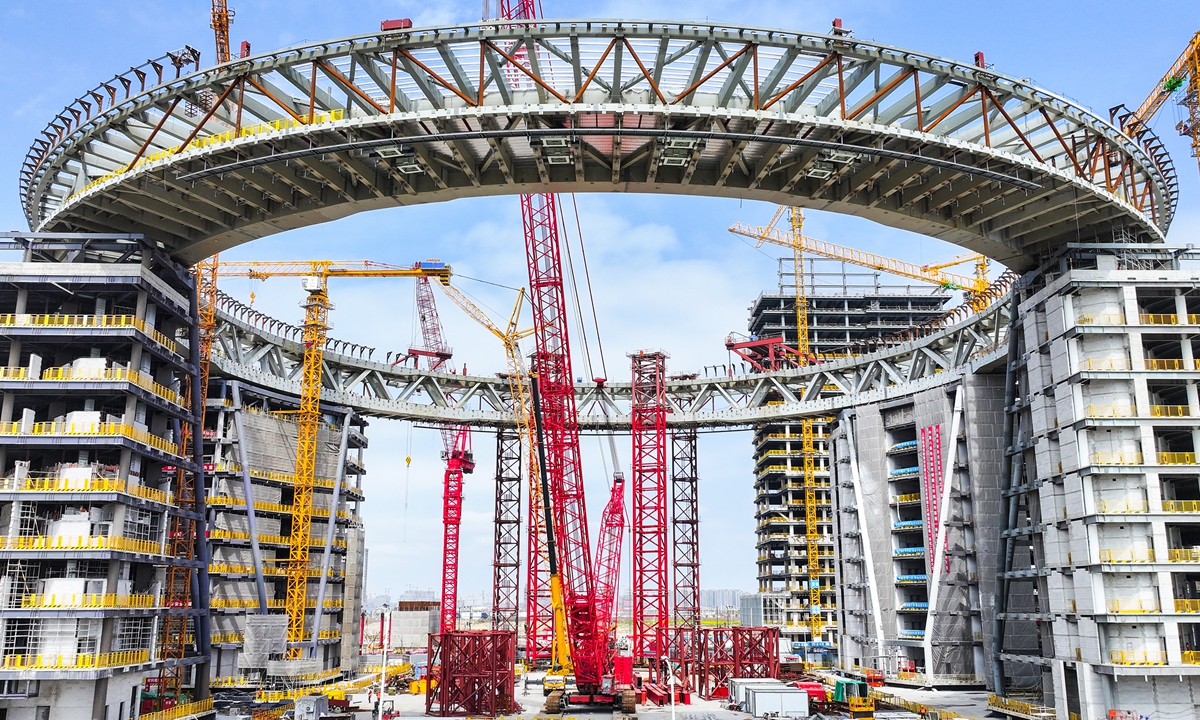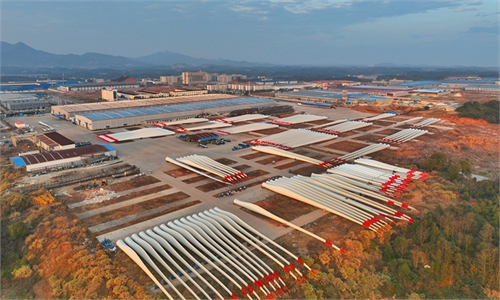Western media's hype of 'foreign capital withdrawal from China' is selective blindness


A future landmark in Shanghai's Lingang Free Trade Zone, "Ring of Lingang Glory," is seen under construction in Shanghai on March 15, 2024. The whole project is expected to be operational by the end of 2024. Official data showed that from 2020 to 2023, Lingang's actual foreign investment had achieved an average annual growth of 45.3 percent. Photo: VCG
Editor's Note: The current intense negative coverage of the Chinese economy by Western media outlets shows that the US-led West is launching cognitive warfare against the Chinese economy, which remains stable and increasingly resilient in the face of headwinds and challenges. Although the "China collapse" rhetoric and other fallacies have been debunked, Western media outlets are relentlessly concocting new terms to discredit the Chinese economy from various perspectives. In response to this coordinated smear campaign, the Global Times is publishing a series of articles to counterattack this drive, specifically addressing the absurd hype about the "lack of transparency in Chinese economic data," "overcapacity in China," and "deflation in the Chinese economy" among others. This is the fourth installment in the series.
For some time, there have been reports and comments in Western media outlets hyping claims of "foreign capital fleeing China."
A Bloomberg report in February about China's foreign direct investment (FDI) actually cited the data of China's direct investment liabilities in its balance of payments, which confused two different concepts and lacked expertise. In statistics, FDI is the amount of investment capital flowing into China from overseas during a particular period.
Although statistics show a certain decrease in FDI year-on-year, this does not necessarily mean that foreign capital is flowing out of China.
Improving FDI quality
The latest Global Investment Trends Monitor, released by United Nations Conference on Trade and Development (UNCTAD) on January 17, showed that global FDI stood at $1.37 trillion in 2023, an increase of 3 percent compared with 2022.
However, excluding funds for tax avoidance, actual total investment decreased, with the EU recording a 23 percent decrease in FDI, the US down 3 percent, China down 6 percent, ASEAN down 16 percent and India down a significant 47 percent. The logic of Western media outlets - that a decrease in FDI is equal to foreign capital flight - contradicts their own reports of India unexpectedly becoming a winner.
The report also points out that the main reasons for the decline are the decrease in cross-border mergers and acquisitions (M&A) and project financing amounts, while greenfield investment continues to grow in many regions. Greenfield investment refers to enterprises established by foreign investors in the recipient country, where part or all of the assets are owned by foreign investors, which directly drives the receiving country's production capacity and employment growth.
In 2023, developed countries saw a decrease of $280 billion in cross-border M&As and a decrease of $157 billion in project financing, but greenfield investment in the US increased by 2 percent, by 8 percent in China and by 37 percent in ASEAN members.
Brazil and Mexico, both in Latin America, provide a good comparison. While Brazil's greenfield investment remained stable, the total utilization of foreign capital decreased by 22 percent due to a significant decrease in project financing by 40 percent.
Mexico, on the other hand, saw a strong growth in greenfield investment, leading to an overall increase in the utilization of foreign capital. Therefore, when measuring the level of foreign investment inflows, it is important to not only look at the total amount, but also pay attention to greenfield investment.
In addition, in the first two months of 2024, the actual utilization of foreign investment in China decreased compared with the same period last year, largely due to the high base of comparison. Although the actual amount of foreign investment utilized in China in 2023 decreased compared with the previous year, it still ranked as the third-highest in history.
In high-tech and other areas, the figures also show a positive trend. In the first two months of 2024, there were 7,160 new foreign enterprises established in China, up 34 percent year-on-year to a five-year high.
The high-tech manufacturing industry attracted 28.27 billion yuan in foreign investment, an increase of 10.1 percent.
These figures all serve as evidence of China's good performance in attracting foreign investment and accelerating development. With China continuously improving the quality of investment and promoting the development of new quality productive forces, it is moving toward high-quality development.
In order to objectively evaluate China and measure the situation of foreign investment, basic indicators should also keep pace with the times. In addition to the total amount, attention should also be paid to quality and investment methods.
China is the stabilizer
Let's compare China's performance in attracting foreign direct investment with other major regions in the world. The main reason for the decline in global FDI is the negative impact of geopolitical tensions and economic fragmentation on capital flows.
Conflicts such as the Russia-Ukraine conflict and turmoil in the Middle East have forced some large-scale M&A projects to be put on hold, leading to considerations of regional risks in corporate investment decisions. Developing countries are most affected by this trend.
In 2023, overall foreign investment inflows into developing countries decreased by 9 percent year-on-year, with ASEAN and India experiencing double-digit declines. Meanwhile, the US continued to build a "resilient supply chain" aimed at suppressing China, constantly advancing bans or restrictions in high-tech trade and investment.
Despite the above-mentioned difficulties, the development and situation in 2023 and recent months still indicate that multinationals from various countries continue to attach great importance to the China market. The trend of investing in China has not fundamentally changed.
Apple, Nvidia, ExxonMobil and Siemens from Germany are all expanding or deepening their cooperation with Chinese companies in the field of research and development.
The 2024 Kearney Foreign Direct Investment (FDI) Confidence Index report released recently has upgraded China's ranking from seventh to third.
Why is China still very attractive to foreign investment despite rising political and economic risks in the world?
First, China is undoubtedly the market with the greatest development potential. As the second-largest economy in the world, if China continues to grow at a rate of 4-5 percent annually in the coming years, it will bring enormous opportunities to investors from around the world.
China is actively promoting the development of new quality productive forces, with its data economy ranking second in the world. Despite various restrictions from the US and the West, the development momentum in artificial intelligence, new energy, and equipment manufacturing is very strong.
In contrast, the world economy is entering a period of low growth. The IMF predicts that 2021-25 will be the slowest five years of growth in the past 30 years. Companies from various countries, especially multinational corporations, are constantly seeking new markets and opportunities, and naturally they cannot ignore the China market.
Second, the importance of the China market lies not only in its total size, but also in its organic integration with the global supply chain. Many multinational companies establish research and development centers, production bases or marketing centers in China, not just for the China market, but as part of their global supply chains.
For example, the research and development center established by the German company Merck in Beijing, its life sciences laboratory in Shanghai and its new materials research center in Suzhou are all global centers serving its global business.
China is the only country that has all industrial categories classified by the UN, with industrial value-added accounting for about 30 percent of the world. Therefore, choosing China is a key strategic move to maintain competitiveness in the global market. This trend is unlikely to change in the medium term.
China opportunities
The 20th National Congress of the Communist Party of China in October 2022 clearly stated the policy of adhering to opening-up to the outside world. In December 2023, the Central Economic Work Conference further determined the policy of expanding institutional opening-up.
In 2024, the negative list for foreign investment will be further shortened. The negative list in the manufacturing sector will be eliminated and foreign investment will be allowed to hold 100 percent of shares in the financial sector.
The Ministry of Commerce and provincial commerce departments have established a roundtable meeting system with foreign businesses in China to regularly listen to their problems and opinions. Governments at all levels in China are working hard to create a legal and business environment that is open, fair and nondiscriminatory for foreign enterprises in China.
It can be ensured that China will continue to utilize foreign investment at a high level of nearly $200 billion annually in the coming era, providing new impetus for the development of the Chinese economy and bringing new opportunities for enterprises from various countries and regions.
Some Western media outlets, with their trademark selective blindness, shamelessly smear China's achievements and progress, even at the expense of abandoning their professionalism. The difficulties, no matter how exaggerated by Western media, will eventually be overcome. Similarly, regardless of the belittling rhetoric made by Western media, China's development will yield abundant fruit. The power to promote global development will increasingly converge toward China, and history will demonstrate that the slanderous rhetoric from Western media is not worth taking seriously.
The author is the executive director of the China International Trade Association. bizopinion@globaltimes.com.cn



